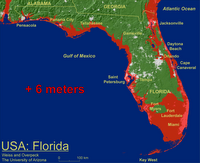
Does God have it in for Disney World? It would seem so. The last time three hurricanes hit Florida in one month was…well, never. With three more storms now swirling around in the Mid-Atlantic, the obvious question is: “what the hell is going on with our weather?”
Given what we know about climate change and hurricanes, it looks like we might be in for more of the same. Simply put, hurricanes are heat engines. When tropical ocean temperatures heat up due to human induced climate change, hurricanes have more fuel and can become much more powerful.
Research from the US National Office of Oceanic and Atmospheric Administration indicates that climate change may result in a 12% increase in hurricane intensity and a 28% increase in rainfall from future hurricanes. The recent catastrophes in the Caribbean appear consistent with these scientific projections. Perhaps the future is now.
The average number of intense (category 3 or higher) hurricanes in the south Atlantic is 2.5 per year. Halfway into the hurricane season we have already seen five such storms and counting. Devastation from storms this year and associated flooding now stretches from Venezuela to Pennsylvania
Besides the tragic loss of life, the sheer expense of all these hurricanes is adding up. The insured losses from Charlie, Frances and Ivan will collectively ring in at over $20 billion US. This is hardly pocket change, especially considering that insured losses are typically about half the actual property damage.
There is a certain irony in all these hurricanes pounding Florida. Governor Jeb Bush, like his brother in the White House, does not support the Kyoto Accord, and has urged the US government to “not sign or ratify any agreement that would result in serious harm to the US economy”. Yet Florida – the fourth most populous state in the union -- is a veritable theme park of the economic perils of climate change.
Ninety five percent of Florida’s 16 million people live on the coast – a bad place to be when sea levels are predicated to rise as much as two feet in the next fifty years. Some low-lying mangroves are predicted to retreat almost 20 kilometres miles inland.
 Coral reefs in Florida Keys are already being bleached bone white due to warming ocean temperatures. This is not good news for the Florida tourism industry, which is worth $47 billion US annually.
Coral reefs in Florida Keys are already being bleached bone white due to warming ocean temperatures. This is not good news for the Florida tourism industry, which is worth $47 billion US annually.The 3 million seniors that live in Florida might be less inclined to do so when summer humidex-corrected temperatures rise by almost 14 degrees Celsius. Increasing incidence of tropical diseases such as malaria, dengue fever and encephalitis will not sweeten the pot either. Florida Seniors contribute $70 billion to the state economy each year.
Increasingly destructive hurricanes are a central part of the climate change ensemble in store for the Sunshine State. The battering Florida has taken so far this year is a wake up call to the violent climate tempest that we are stirring up. One decent size hurricane packs a truly wrathful amount of power – over 200 times the collective electricity-generating capacity of the entire human race. The splintered buildings left in Ivan’s wake are a stark warning of what the future may hold.
The response from government officials to this looming global crisis has hardly been heroic. The Chair of the US Senate Committee on Environment and Public Works. blandly stated earlier this year: “I'm becoming more and more convinced...that global warming is the greatest hoax ever perpetrated on the American people and the world.”
Smug words from compromised politicians will not help us. Such climate change deniers seem ever more offensive in light of the increasing environmental casualties around the world.
Here in Canada, the upcoming Throne Speech will reveal how Paul Martin intends to implement the now long-in-the-tooth Kyoto Accord. He has a real opportunity to take a much more visionary path than our neighbors to the south and begin to chart a truly sustainable course for Canada.
One thing is certain. If we and our elected political leaders choose to ignore climate change, we will have to answer to a higher power – an increasingly violent planet.
Does God hate Disney World? As always, it is difficult to figure out what is on God’s mind. Mother Nature, on the other hand – she might be trying to make a point.
Published in August 2004 in the National Post






